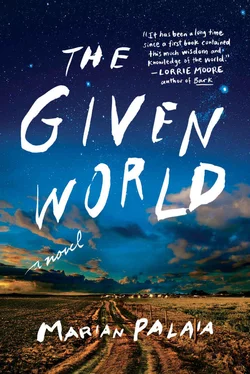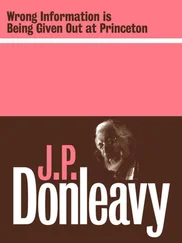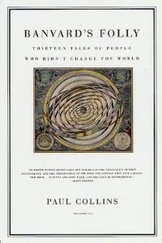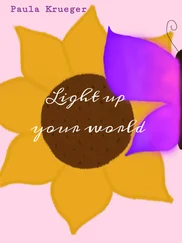“Did I ever tell you,” he says, bouncing a quarter, in some trick manner, off the wooden floor and snatching it out of the air on its way back up, “that I was named after John Coltrane?” He knows, since he’d been in the bar last night with her until past closing, that she has a hangover, and he is hoping to maybe distract her from it. He doesn’t get hangovers. Not really. She has told him it is because he is young. “Just wait,” she says. “You’ll get yours too.” But he doesn’t expect to live long enough to be old enough for that. Does not count on it at any rate.
“Only about a hundred times,” she says, smiling with that mouth. She stacks just-washed glasses on the stainless-steel drain board and dries her hands on the white bar towel she pulls from her back pocket. Takes two more aspirin and washes them down with Kahlúa-laced coffee. She’ll be cured — or drunk again — by the end of her shift, but she’ll keep it together; like always. Almost always. At least more often than not.
“How about the one—”
“Where your heart was turned around backward when you were born?”
“Yes. That one. Did I ever tell you that one?”
“No,” she says, coming around the bar to sit next to him and listen. “Tell me the story about your heart.”
It is not a long story, but it comes with illustrations: before and after. On a small white bar napkin, he draws with a black felt-tip pen the outline of what is ostensibly a baby boy. He draws it without lifting the pen so it ends up looking like the outline of a chunky adult chalked on the sidewalk, the aftermath of a drive-by down at Army and Folsom. He draws the heart, shaped exactly like a Valentine candy one, and reaches across the bar for another napkin. The second drawing looks almost exactly like the first, except on one he letters a small B on the heart, and an F on the other one. “See,” he says, putting the pen in his back pocket, “that’s how they did it. Unhooked it, flipped it over, and hooked it back up again. Good as new.” He pats himself on the chest like a Boy Scout in the bleachers, waiting for “The Star-Spangled Banner” to get to the good part.
It isn’t good as new, though. His heart isn’t. It needs special care, and instead he feeds it pints of Anchor and shots of Beam. Speed sometimes, when he can get it. Riley, unlike the other bartenders, is stingy with the whiskey. He knows it is because she cares about him, and because he tends to get sullen on the brown stuff; it makes him feel sorry for himself. He doesn’t want to feel sorry for himself, but he does want the warm numbness, the feeling of invincibility he has heard most young people have until they are at least thirty. He has some years to go yet and would like to feel that way for a few of them anyway.
Spring comes on a Sunday, and they walk to the flea market at the bottom of the hill. Riley lets Cole hold her hand, for a little while. It makes him happy, makes him feel safe, or as if he is taking care of her. He pretends he has a girlfriend; a version of Riley who could be that. The market smells, in turn, like diesel fuel, Mexican food, and the bay, and Cole sees a group of men in animated conversation in another language. They all look very serious, despite the fact that one of them is wearing a foam hat shaped like a wedge of cheese. Cole points the group out to Riley.
“ Très chic, ” Riley says. And they laugh, go on to paw through tarnished silverware and cheap jewelry. Riley tries on a ring made from an old silver spoon. Cole wants to buy it for her, but she says, “Don’t be silly. I don’t need a ring. I’d just lose it.” She puts it back in the case and walks away. Looks back to make sure he isn’t up to something.
When they are done shopping, they take the bus back up the hill because they are carrying their purchases, not because of Cole’s untrustworthy heart. They have both found cowboy boots: Riley’s a pair of deep-brown, hand-tooled Tony Lamas and Cole’s a gaudy pair of snakeskins with no discernible label. Riley has added to her collection of T-shirts, and Cole has found one as well. It says, “Dip Me in Honey and Throw Me to the Lesbians.”
“Oh yeah,” Riley says. “The girls are going to love that.”
“I know.” He is delighted, grinning pork chop to pork chop. Some of the women at the bar are still not smitten with him, but he knows very soon any lingering resistance will be futile.
When they get back, Lu — one of the irregulars, out for the time being on her own recognizance — is the first to weigh in. “Where the fuck did you get that?”
“Flea market,” Cole says proudly.
Lu holds her hand out. “Give it to me.”
“Sorry, Lu. Not this one.”
She narrows her eyes. Turns her back and hunches over her drink. “You little shit.”
He laughs. This one loves him for sure. He can tell by how fierce she is. And she is the same with Riley, only different. They have a thing, but Cole hasn’t figured out what it is yet. He thinks it might be a simple wish on Riley’s part to mend broken objects. Of which he is not one.
When Riley is busy, and it is pointless or at least ill-advised to vie for her attention, Lu and Cole play pool together, or pinball, or wander around the neighborhood collecting stuff people leave out on the sidewalks. They present Riley with treasures to take her mind off her hangovers, her regrets, her drug-addicted boyfriend, and to keep reminding her that they are her best (however damaged) angels. They give her a broken but still beautiful and delicate gold chain; an old green typewriter missing only a few keys; potted succulents for the windowsill, clay pots chipped in places but still perfectly good. Some of the scraggly little suckers are even in bloom. Riley makes room for it all, since neither Cole nor Lu lives anyplace in particular.
“We are campers!” Cole says. Because life is nothing short of a grand adventure.
At the moment he is camping out at a pizza joint just the other side of the panhandle. The man who owns it is an old friend of his mom and dad, and has given Cole something of a job — gopher, really; fill-in prep cook — even though the kid is nothing if not unreliable. He tries really hard. But something keeps wanting to yank him back, to a time when he was someone else’s responsibility.
After closing — if Riley has not drunk all the shots people buy for her during her shift, and/or snorted any of the lines of coke they leave for her in the bathroom — and after Cole has helped her clean the bar, Riley drives him to the restaurant, to sleep on his bedroll in the small dining room.
It is usually after three by the time they get on the road, and this night they are still wound up. She leaves the car parked on Stanyan, and they run together into Golden Gate Park, past the tents and sleeping bags scattered at the edge, through the tunnel, onto the soccer fields, and then farther, into the woods. Other nights they’ve gone all the way to the ocean. They don’t care that the grass is wet or that the moon shines down on them only in their minds, hidden as it is by the unrelenting fog. They pretend they are actually in the ocean, in a fabulous place only they know about, able to walk around and breathe underwater because they are special.
Sometimes Riley takes her clothes off and dives into some damp thing: Stow Lake, a lily pond, a pile of medicine-scented eucalyptus leaves, the sea. She lies down on the wet grass and tells Cole stories about Montana and its mountains; its dinosaurs, fossils, and preposterously blue sky. She talks about the South China Sea and about a brother she says she invented because she is an only child. He wants to hold her, bury his face in her hair, tell her he knows how she feels. But it is enough — he lets it be enough — to be connected to her by this, by anything.
Читать дальше












